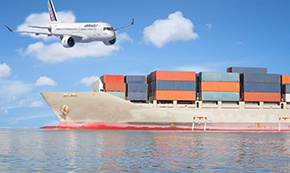All categories >
Professional transportation service of Shipper's Own Container (SOC) in the United States.
Categories:
Time of issue:
2024-08-23 15:21
High flexibility: It can better meet the special transportation requirements of shippers. For example, when there are specific needs for loading methods, transportation times, and transportation routes of goods, it can be arranged more flexibly.
Cost management: Although purchasing or leasing an SOC container requires a certain cost, for shippers with a long-term need for transporting a large amount of goods and having special requirements for the transportation process, the overall cost can be reduced by optimizing the transportation plan and container usage efficiency.
Reducing the risk of cargo damage: The shipper can manage the packaging and loading process of goods more meticulously, thereby reducing the risk of damage to goods during transportation due to improper operation and other reasons.
Cargo packing: Conduct cargo packing at an appropriate location and operate strictly in accordance with packaging requirements and safety regulations to ensure that the goods are stable and reasonably distributed in the container.
Transportation arrangement: Select an appropriate transportation method (such as sea transportation, air transportation, land transportation, etc.) and transportation company. Negotiate transportation contracts, fees, transportation times and other details with the transportation company.
Customs declaration and clearance: According to relevant regulations of the United States, prepare necessary customs declaration documents, and conduct accurate and timely customs declaration and clearance procedures when the goods arrive at the US port to ensure that the goods can enter the US market smoothly.
Destination delivery: After the goods arrive at the destination in the United States, deliver and unload the container as agreed with the consignee.
Compliance with regulations: Fully understand the laws, regulations and policy requirements of the United States regarding container transportation, import and export of goods, etc., to ensure the legality and compliance of the transportation process.
Insurance purchase: Consider purchasing cargo transportation insurance and container insurance to deal with possible unexpected situations such as cargo damage, loss, transportation delays, etc., and reduce potential economic losses.
Check whether the company has relevant industry certifications and qualifications, such as international freight forwarding qualifications, which is a manifestation of its legality and professional ability.
Have a strong domestic and international network and resources. For example, have their own branches, agents or partners in major ports and cities at home and abroad to ensure the smooth connection and efficient handling of goods during transportation. Like Lucky Shipping, it has branches in many places in China such as Shenzhen, Xiamen, and Ningbo. It also has branches in Los Angeles, USA and Vancouver, Canada. The agency network covers more than seventy countries around the world.
However, price is not the only consideration factor. You cannot choose only because of a low price. You need to comprehensively consider service quality and cost performance.
A reliable transportation company will have a perfect cargo tracking system, allowing you to grasp the location and transportation status of the goods in real time, such as providing an online query platform or regular transportation status update reports.
You can also consult peers or people in related industries to understand their views and recommendations on different transportation companies.
Understand the company's compensation process and handling methods in case of problems to ensure that your rights and interests can be protected.
Examine the professionalism, response speed and service attitude of its customer service team. For example, when dealing with emergencies during transportation, whether it can actively communicate with you and coordinate solutions.
At the same time, understand whether the company has a certain degree of flexibility in the contract execution process and can make appropriate adjustments and negotiations according to your special requirements or emergencies.
Logistics Query
Quickly obtain the latest logistics information
Scan code contact
Address: 25/F Room C,Tower A, Honglong Century Plaza, No. 4002 Shennan East Road,Luo Hu District, Shenzhen, China
Zhongshan Address: Room 805, Floor 8 , Poly Plaza office Building, No. 1 Shiji East Road, Port Town, Zhongshan, Guangdong
Changsha Address: 12020, Building 2, Fudi Xingguang Tiandi, Yuhua District, Changsha .,Hunan
Indonesian company:PT VTOP LOGISTIK INTERNATIONAL
Indonesian address:Jalan Pantai Indah Barat Komplek Toho Blok A No 18 ,Kec.Penjaringan,Kel.Kamal Muara,Jakarta Utara

WeChat ID

Scan code contact









